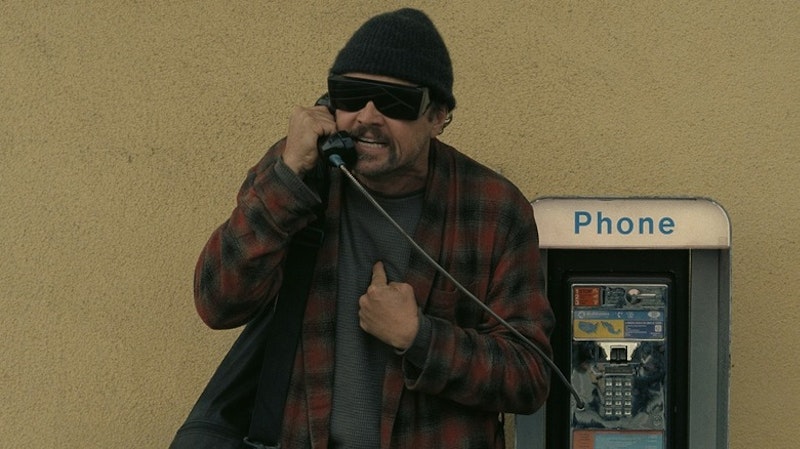One recently-deceased, young political media figure and one notoriously reclusive elderly one had effects on the culture this summer, each in his own way opposing violent authoritarianism. Their fans—disproportionately libertarian and disproportionately leftist, respectively—might stubbornly refuse to see the commonalities, which is tragic. That’s why we fight.
The horror movie Weapons—about a town torn apart by the simultaneous disappearance late one night of 17 elementary school students—is great, and I’ll not saddle it with any specific political message. However, writer/director Zach Cregger (who also wrote and directed the thriller Barbarian about the worst possible short-term rental apartment) admits that a big influence on Weapons was his effort to come to grips with his best friend’s death, which fans assume means the death in 2021 of one of his fellow members of the popular comedy troupe Whitest Kids U’ Know, libertarian (and “local sexpot”) Trevor Moore.
Like a combination of the film Rashomon and “the Five Stages of Grief” from the book On Death and Dying, multiple characters in Weapons respond in contrasting ways to the students’ absences, from denial to anger, each pass Cregger takes at the story getting us a bit closer to the explanation, even as the answer looks increasingly implausible and nightmarish.
In the real world, Moore’s fans, knowing he loved conspiracy theories, were bound to take multiple passes at explaining his death, apparently the result of a fall from his deck—but might the government have finally gotten fed up with his subversive comedy? Might the accident have been the result of Moore being high, given how many jokes he did about drugs and the ongoing, idiotic drug war? Might he have been drunk, as apparently Cregger and before that Cregger’s parents often have been (with even the film’s logo seeming to allude to the Alcoholics Anonymous symbol)?
As in Weapons, the anxiety of not knowing the truth, of perhaps never being able to know for sure, adds to the fear and sorrow.
There’s also an absence at the heart of Paul Thomas Anderson’s One Battle After Another, inspired by Thomas Pynchon’s novel Vineland, namely that of Perfidia (Teyana Taylor), the beautiful but homicidally sociopathic leftist revolutionary with whom our protagonist Bob a.k.a. Pat (Leonardo DiCaprio) is smitten but who flees to Mexico without him. Stoned and dispirited, Bob/Pat is left to deal, even decades later, with the fallout of Perfidia’s revolution, including the vengeful attentions of a U.S. military man named Lockjaw (Sean Penn) in league with rich white supremacists.
If the nagging question in Weapons is “What happened?” the comparably nagging—and similarly absurd, funny, and horrifying—question in One Battle After Another is “Is this struggle worth it?” Pynchon’s implicit answer seems to have been a non-judgmental probably-not, in so far as terrible things happen to committed revolutionaries without obvious gains for society, though the protagonists are stubborn to the end and beyond. Perfidia kills a law-abiding, even heroic man for the sake of completing a bank robbery, but Pat/Bob loves her anyway—and in these days of praise for leftist murderer Luigi Mangione and hatred for talkative conservative Charlie Kirk, maybe half the audience loves her as well.
One Battle After Another could almost take place in the 1960s or 1970s. Anderson likely assumes Pynchon had those times in mind—the days when a person like Queens-born JoAnne Deborah Byron might become Black Liberation Army-serving Assata Shakur (who died one day before One Battle After Another was released but probably would’ve liked the movie). Shakur could kill a cop on the New Jersey turnpike but still go on decades later to be honored by a Chicago teachers union, so maybe times haven’t really changed that much. The opening sequence of the movie feels like a present-day attack on a fascistic I.C.E. holding pen, garnering a bit more sympathy than would a broad, vague onslaught against capitalism and all the innocent bystanders who happily trade to mutual benefit within it, many of them black and some of them hippies.
This is only the second film adaptation of Pynchon, and both have been by Paul Thomas Anderson. His Inherent Vice was a meandering noirish muddle, but this one feels sharp and high-energy and more logical even when wandering to strange places. With anti-I.C.E. activists in the real world apparently recently shooting and killing a migrant in Texas by accident and perhaps setting fire to rapper Ice Cube’s tour bus due to confusion about his name, all but the most fanatical leftists can understand why their side gets parodied these days. If you can’t laugh, you’ll cry.
Pynchon is another piece of evidence for the argument that postmodernism has a slight conservative streak, if only because this aesthetic refuses to overlook absurdity on the left even when excoriating the right. Heck, even Pynchon’s very-radical green anti-tech college pal Kirkpatrick Sale, who like Pynchon is pushing 90, is so skeptical of government that he sounds more like a limited-government conservative than does the average member of the current GOP, alas.
If Anderson didn’t want to call his movie Vineland, originally the name of a northern-Canadian region explored by Vikings, maybe he should’ve called it Greenland for maximum resonance in the Trump era, what with our mad leader lately wanting to annex that vast, cold place. Unfortunately, that title is already taken by a Gerard Butler action movie about an asteroid impact, which will have a sequel out next year. It’s hard to believe that’ll be as frightening as an elementary school or as ominous as politics, though.
—Todd Seavey is the author of Libertarianism for Beginners and is on X at @ToddSeavey

